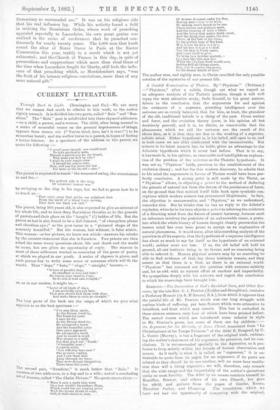A Candid Examination, of Theism. By " Physions." (Triibner.) —"
Physicus," after a subtle, though not what we regard as an adequate analysis of the Theistic question, though it will well repay the most attentive study, finds himself, to his great sorrow, driven to the conclusion that the arguments for and against the existence of a supreme, presiding intelligence over the universe are so evenly balanced, that for him, at least, the grandeur of the old, traditional beliefs is a thing of the past. Given matter and force, and the evolution theory (now, in his opinion all but decisively proved), and it is, he thinks, as conceivable that the phenomena which we call the universe are the result of the above data, as it is that they are due to the working of a supreme, infinite mind. Either hypothesis is, in his belief, still open to us, and in both cases we are alike confronted with the inconceivable. But science in its latest aspects has, he holds, given an advantage to the Atheistic hypothesis which it never had before. That is to say, it has made it, in his opinion, as reasonable and intelligible an explana- tion of the problem of the universe as the Theistic hypothesis. It was not so, "Physicus" holds, previous to the establishment of the evolution theory ; and but for this modern discovery, he admits that to his mind the arguments in favour of Theism would have been per- fectly conclusive. A strong point is still made by the Theist, as " Playsicus " allows, in objecting a priori to the method of deducing the genesis of natural law from the datum of the persistence of force, on the ground that that method itself falls back upon symbolic con- ceptions which modern science has pronounced illegitimate. In fact, the objection is unanswerable, and " Physicus," as we understand, concedes this. But he thinks that he has no reply to the Atheist's rejoinder, when he in his turn objects a priori to inferring the existence of a directing mind from the datum of cosmic harmony, because such an inference involves the postulate of an unknowable cause, a postu- late which the whole history of human thought clearly proves that the human mind has ever been prone to accept as an explanation of natural phenomena. It would seem, after this searching analysis of the question in all its aspects, that the hypothesis of a supreme intelligence has about as much to say for itself as the hypothesis of an external world ; neither more nor less. If so, the old belief will hold its ground, all our instincts being in its favour, and no reasoning being able to subvert it. Human physical science may by no searching be able to find evidence of God, but these instincts remain, and they assure us that there is a God, as there is an external world. " Physicus " has reasoned out the question with extreme subtlely and, let us add, with an earnest effort at candour and impartiality. We sympathise deeply with his sorrows, and regret the conclusion to which his reasonings have brought him.






























 Previous page
Previous page